Ambrose Bierce Quotes
Most popular Ambrose Bierce Quotes
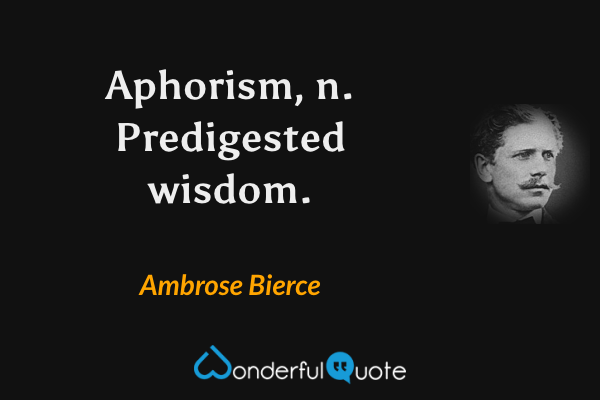
Aphorism, n. Predigested wisdom.

Habit, n. A shackle for the free.
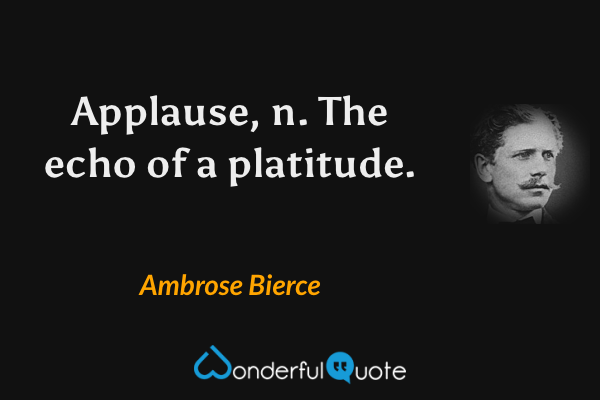
Applause, n. The echo of a platitude.
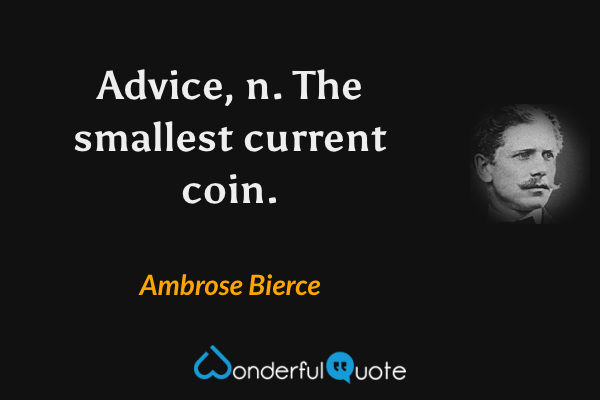
Advice, n. The smallest current coin.

Famous, adj. Conspicuously miserable.

Adage, n. Boned wisdom for weak teeth.
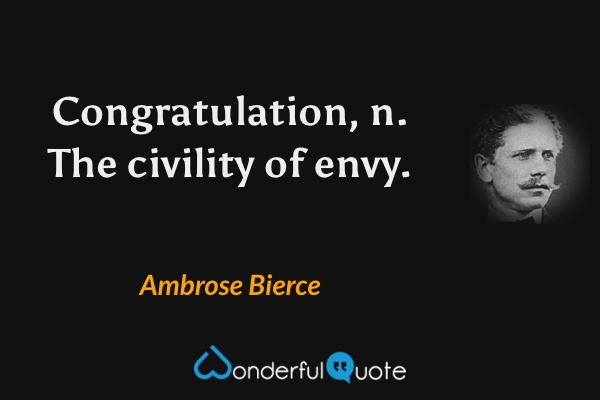
Congratulation, n. The civility of envy.
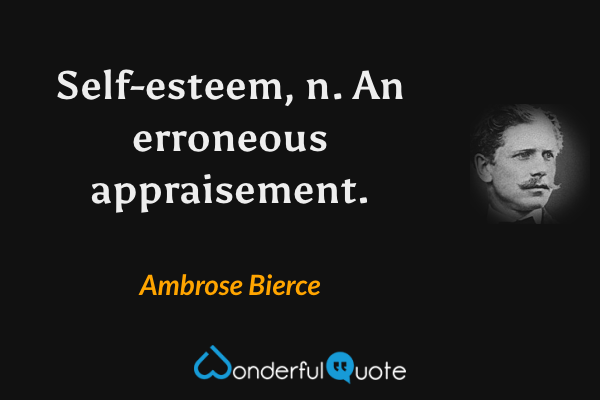
Self-esteem, n. An erroneous appraisement.
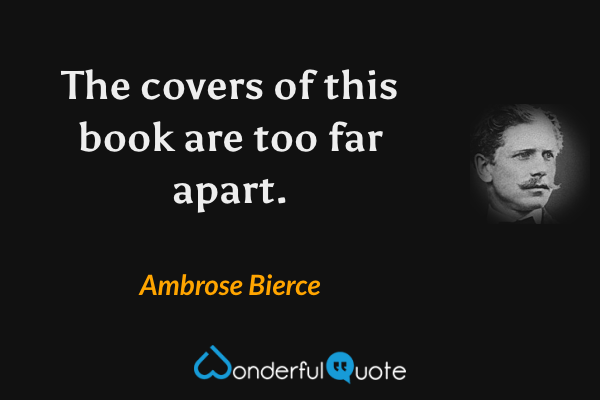
The covers of this book are too far apart.
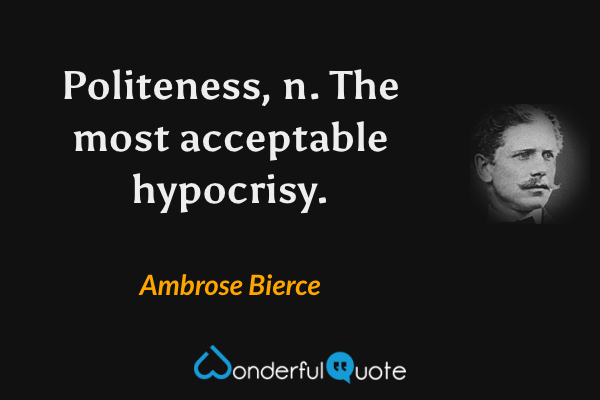
Politeness, n. The most acceptable hypocrisy.
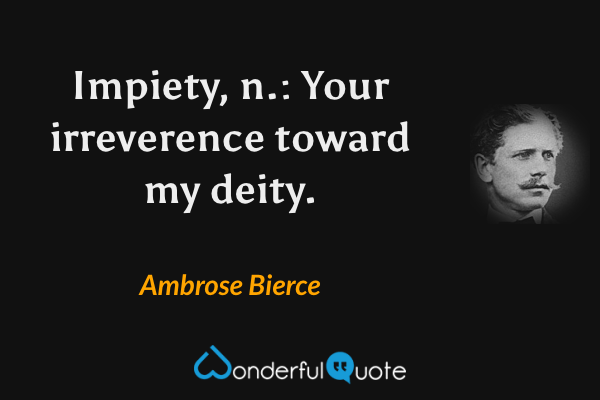
Impiety, n.: Your irreverence toward my deity.
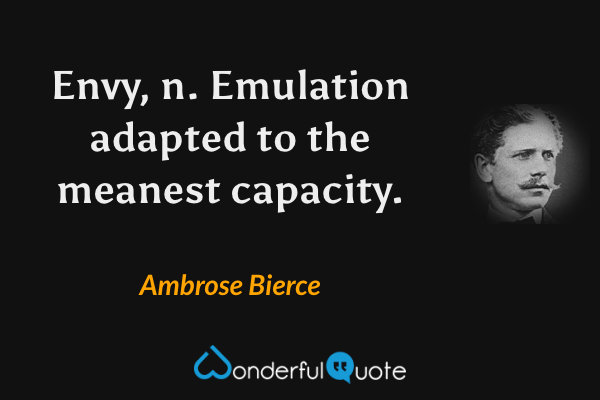
Envy, n. Emulation adapted to the meanest capacity.
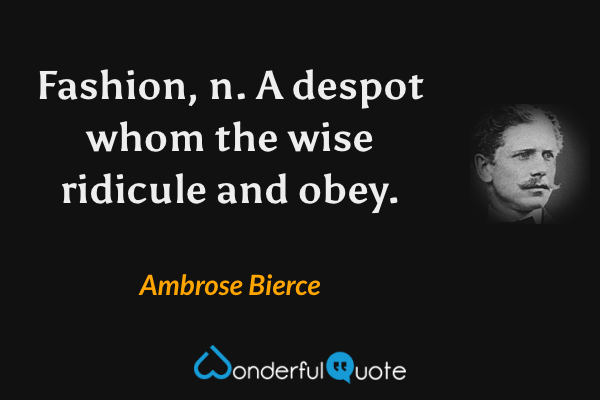
Fashion, n. A despot whom the wise ridicule and obey.
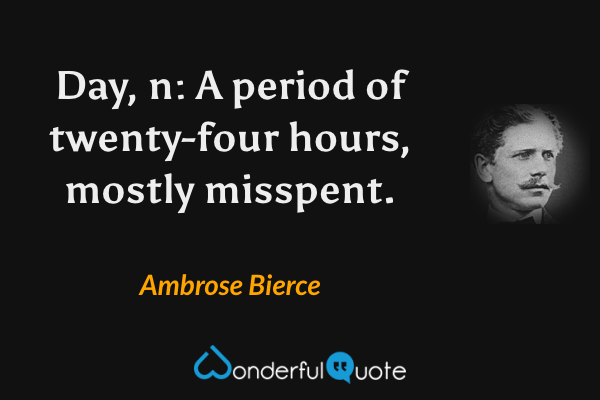
Day, n: A period of twenty-four hours, mostly misspent.

Egotist: a person more interested in himself than in me.
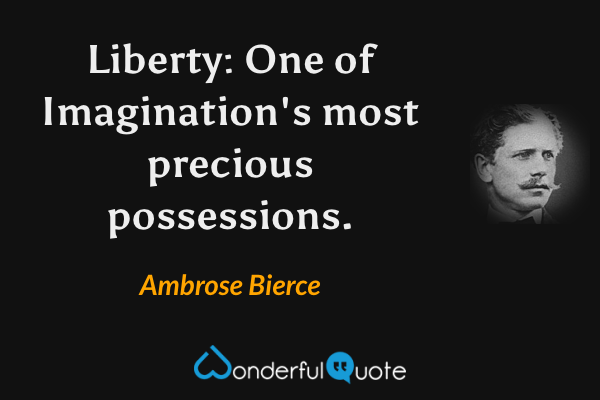
Liberty: One of Imagination's most precious possessions.

Bore, n. A person who talks when you wish him to listen.

Success is the one unpardonable sin against our fellows.
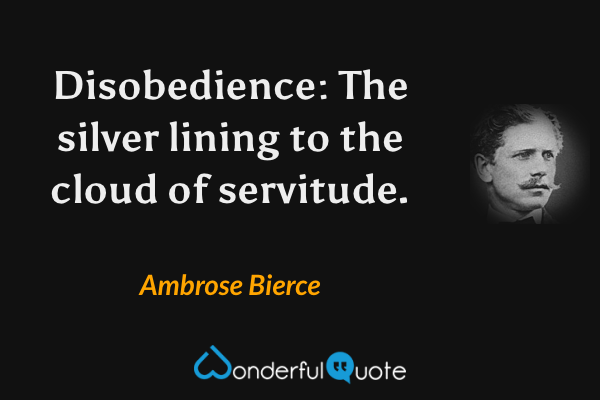
Disobedience: The silver lining to the cloud of servitude.
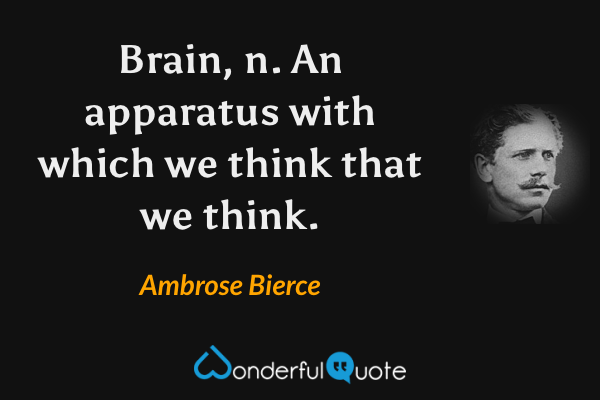
Brain, n. An apparatus with which we think that we think.
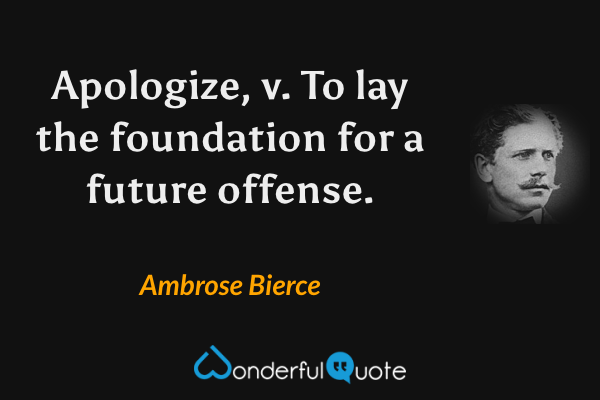
Apologize, v. To lay the foundation for a future offense.

Omen: A sign that something will happen if nothing happens.
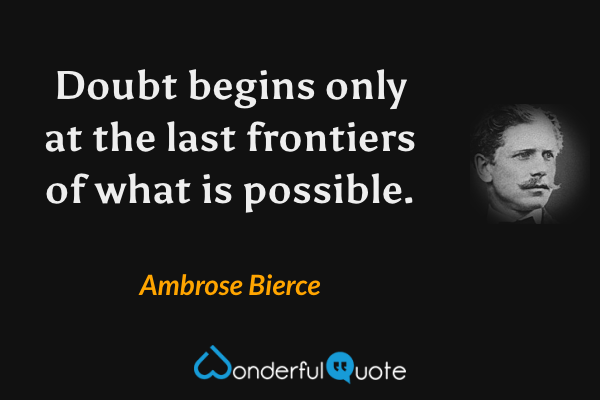
Doubt begins only at the last frontiers of what is possible.

Life, n. A spiritual pickle preserving the body from decay.
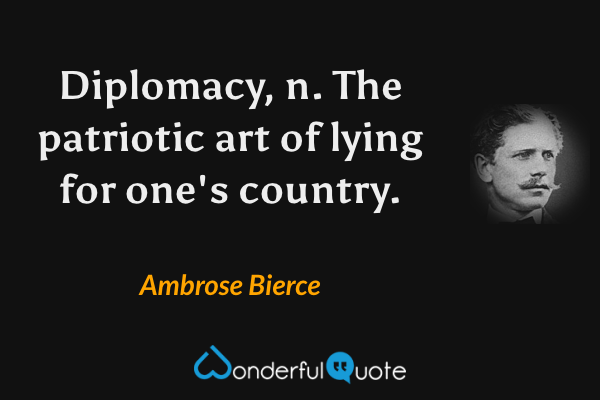
Diplomacy, n. The patriotic art of lying for one's country.
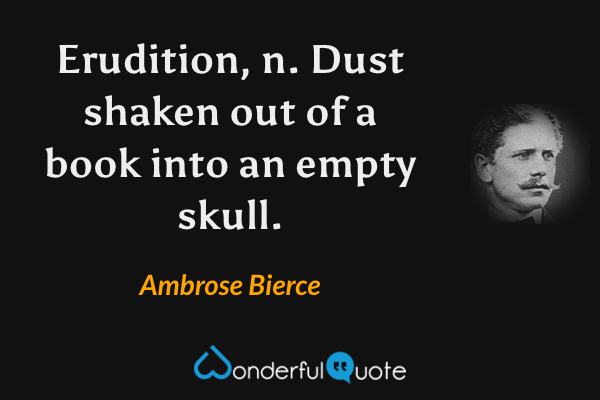
Erudition, n. Dust shaken out of a book into an empty skull.
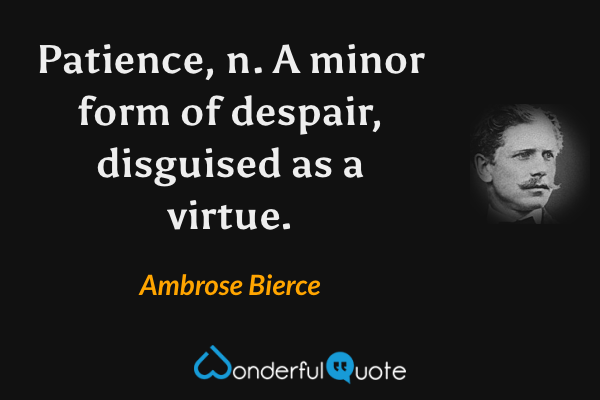
Patience, n. A minor form of despair, disguised as a virtue.
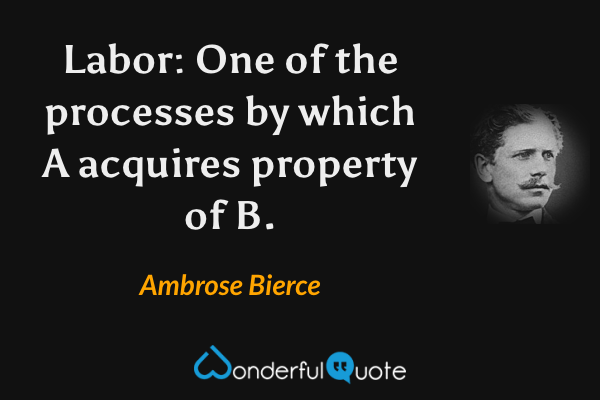
Labor: One of the processes by which A acquires property of B.
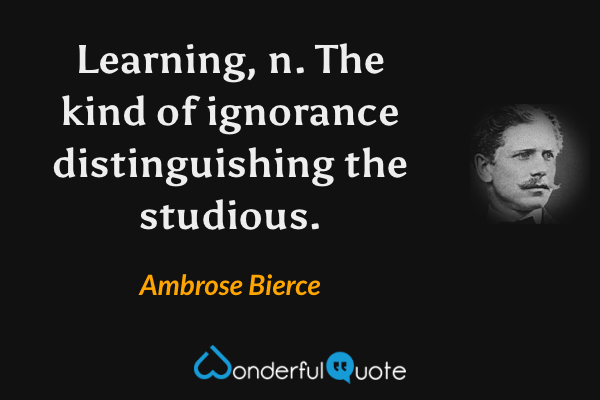
Learning, n. The kind of ignorance distinguishing the studious.
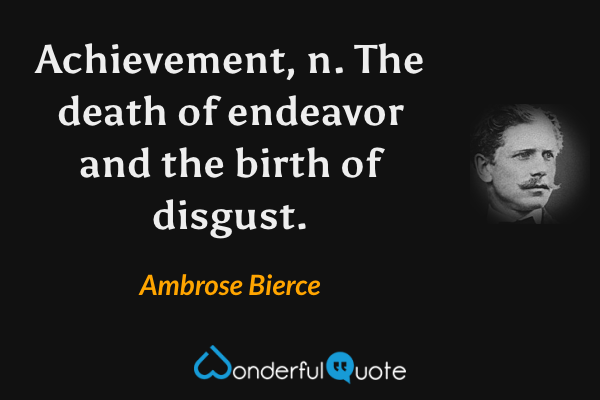
Achievement, n. The death of endeavor and the birth of disgust.
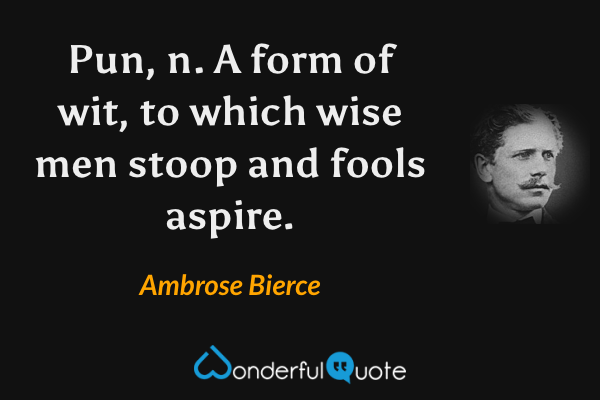
Pun, n. A form of wit, to which wise men stoop and fools aspire.

Coward, n. One who in a perilous emergency thinks with his legs.

A prejudice is a vagrant opinion without visible means of support.
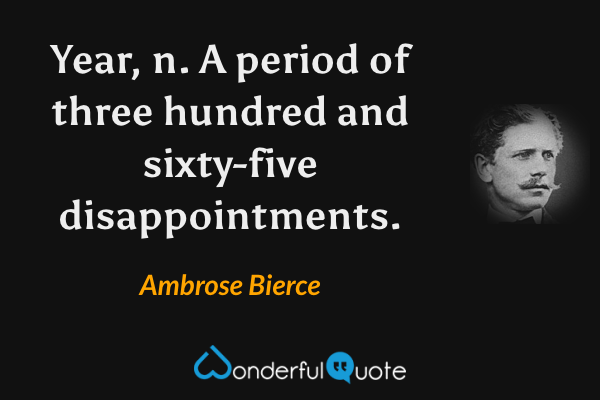
Year, n. A period of three hundred and sixty-five disappointments.
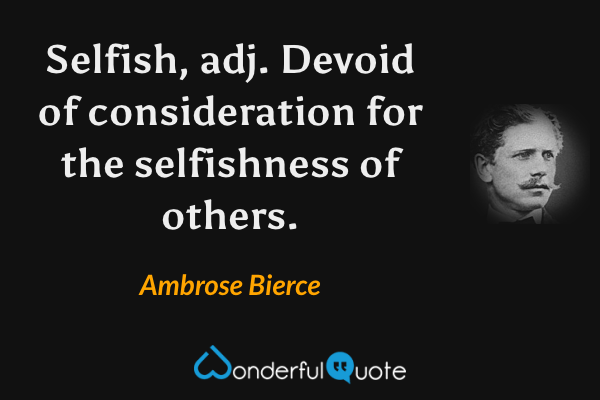
Selfish, adj. Devoid of consideration for the selfishness of others.

What is worth doing is worth the trouble of asking somebody to do it.
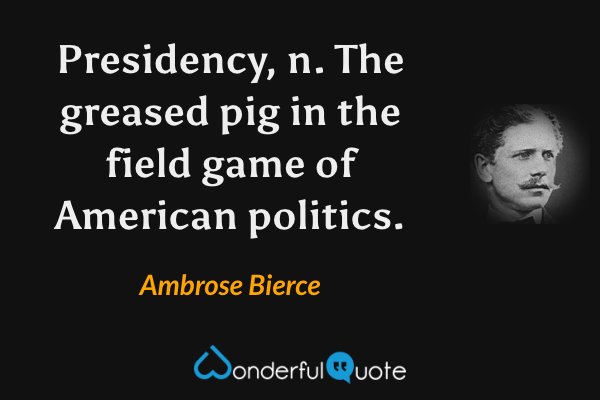
Presidency, n. The greased pig in the field game of American politics.

Consult: To seek approval for a course of action already decided upon.

Fidelity, n. A virtue peculiar to those who are about to be betrayed.
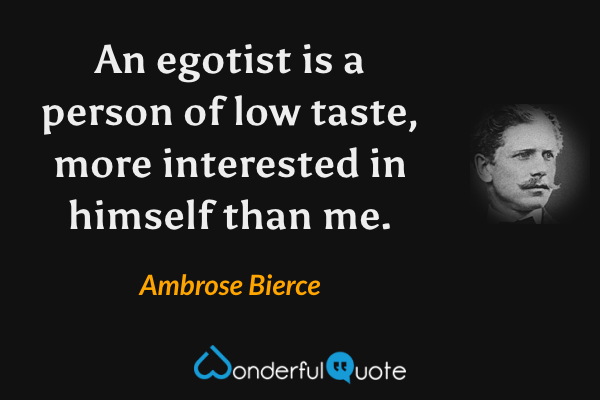
An egotist is a person of low taste, more interested in himself than me.

Don't steal; thou'lt never thus compete successfully in business. Cheat.

To the eye of failure success is an accident with a presumption of crime.
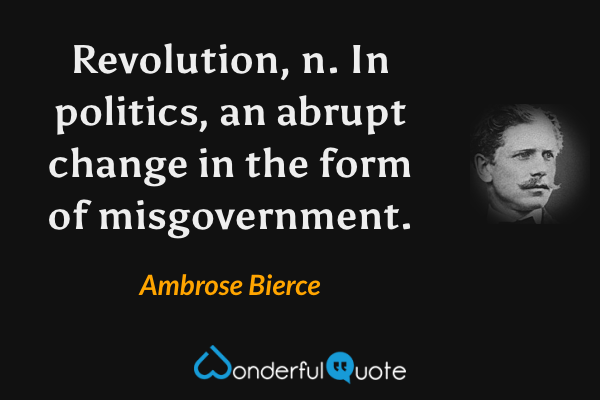
Revolution, n. In politics, an abrupt change in the form of misgovernment.
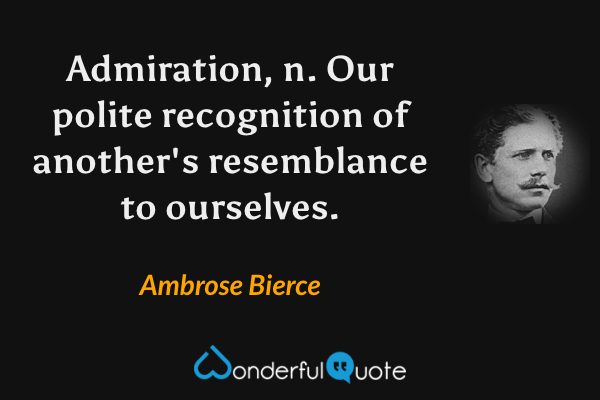
Admiration, n. Our polite recognition of another's resemblance to ourselves.
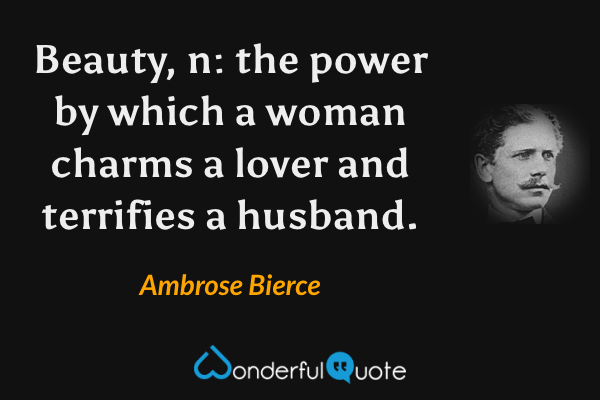
Beauty, n: the power by which a woman charms a lover and terrifies a husband.
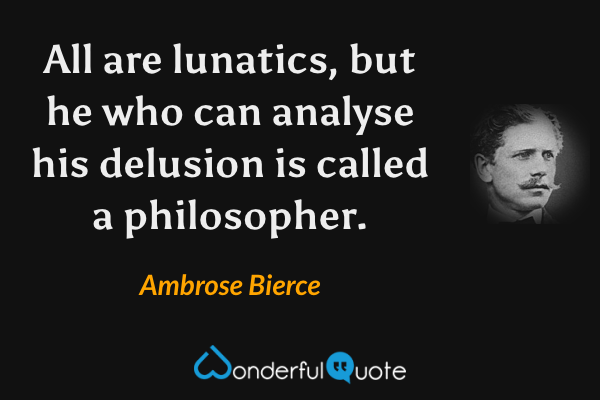
All are lunatics, but he who can analyse his delusion is called a philosopher.
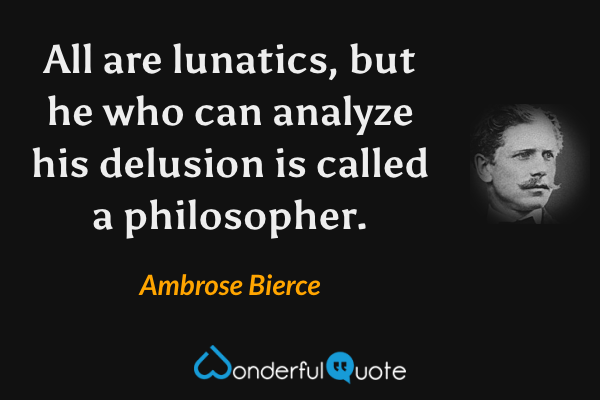
All are lunatics, but he who can analyze his delusion is called a philosopher.

Lawsuit, n. A machine which you go into as a pig and come out of as a sausage.
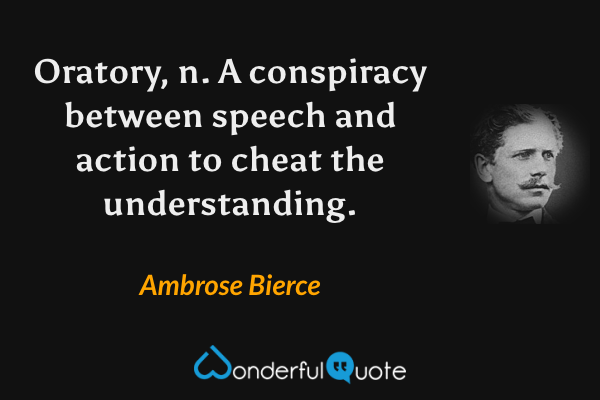
Oratory, n. A conspiracy between speech and action to cheat the understanding.

Speak when you are angry and you will make the best speech you will ever regret.
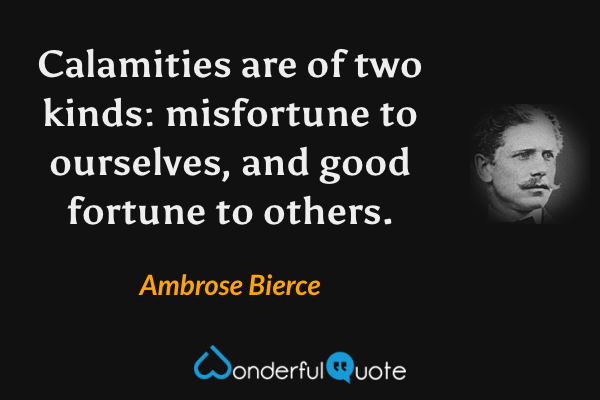
Calamities are of two kinds: misfortune to ourselves, and good fortune to others.
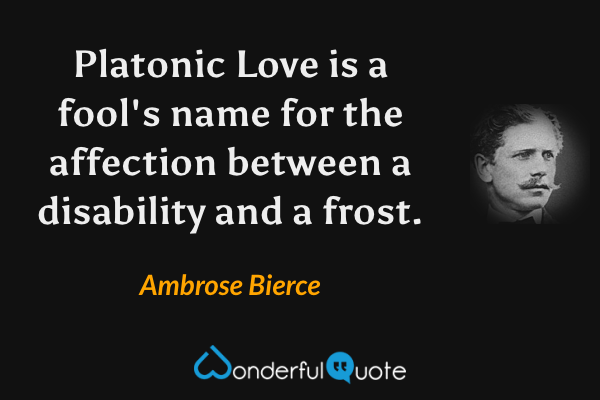
Platonic Love is a fool's name for the affection between a disability and a frost.
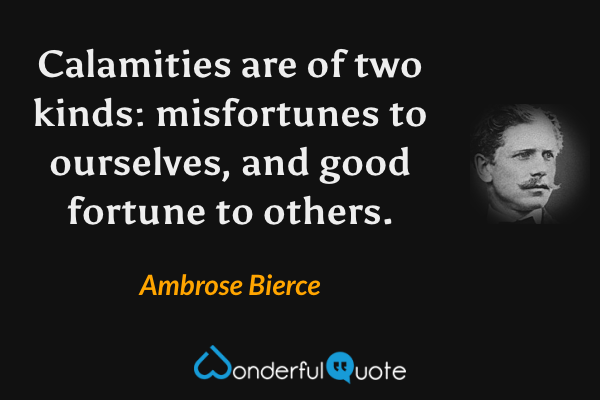
Calamities are of two kinds: misfortunes to ourselves, and good fortune to others.
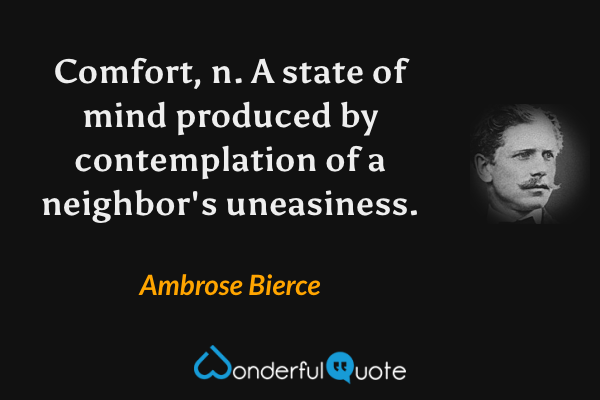
Comfort, n. A state of mind produced by contemplation of a neighbor's uneasiness.

Architect, n. One who drafts a plan of your house, and plans a draft of your money.

We know what happens to people who stay in the middle of the road. They get run over.
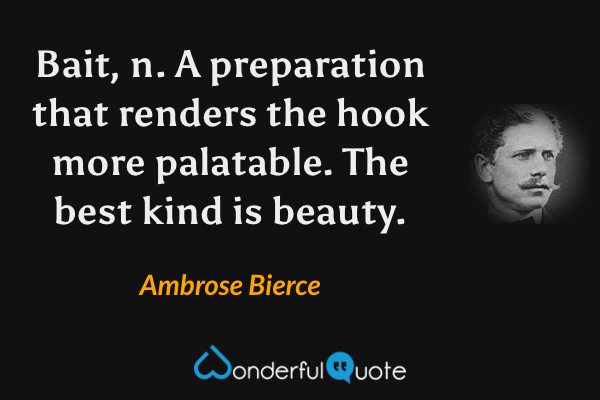
Bait, n. A preparation that renders the hook more palatable. The best kind is beauty.
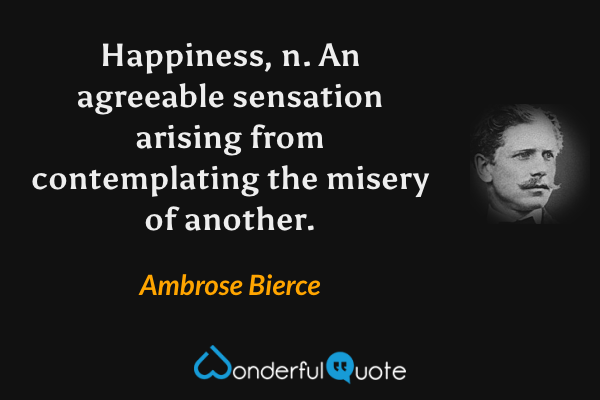
Happiness, n. An agreeable sensation arising from contemplating the misery of another.
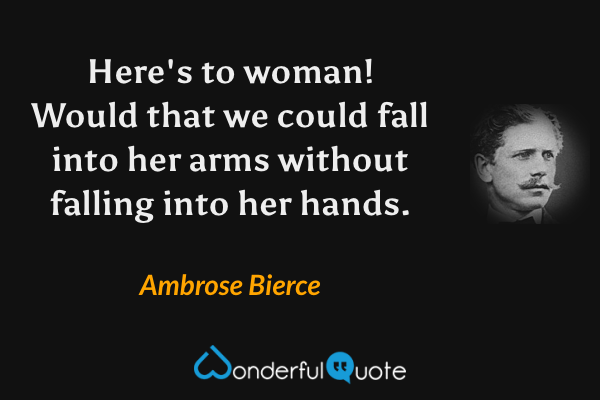
Here's to woman! Would that we could fall into her arms without falling into her hands.

Corporation: An ingenious device for obtaining profit without individual responsibility.
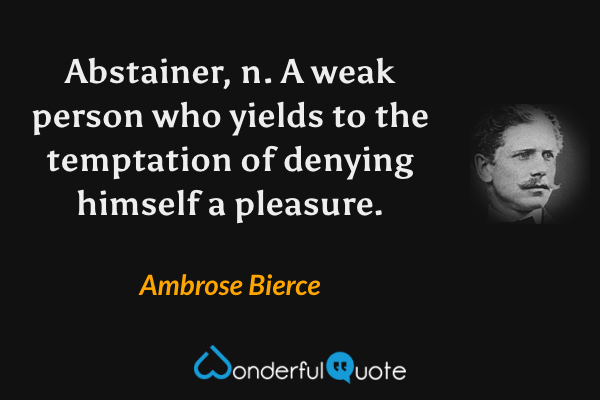
Abstainer, n. A weak person who yields to the temptation of denying himself a pleasure.
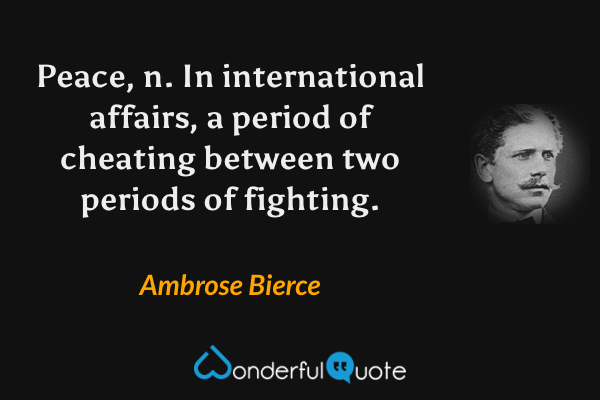
Peace, n. In international affairs, a period of cheating between two periods of fighting.
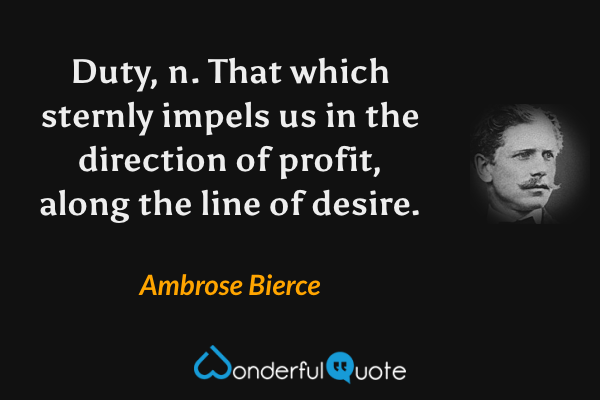
Duty, n. That which sternly impels us in the direction of profit, along the line of desire.
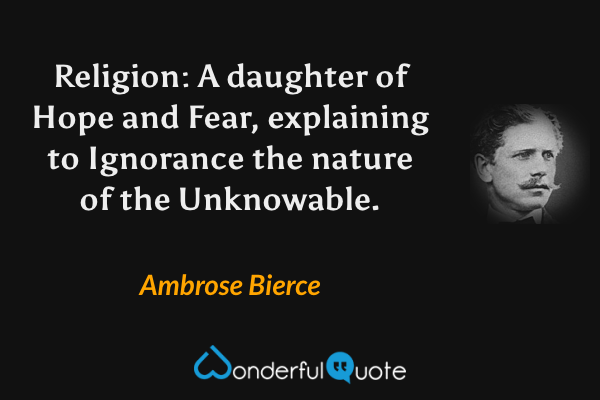
Religion: A daughter of Hope and Fear, explaining to Ignorance the nature of the Unknowable.
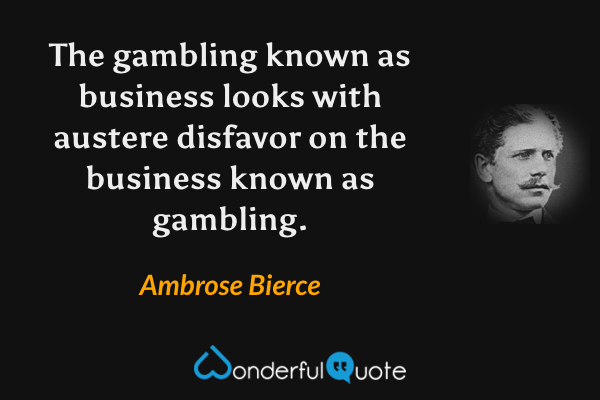
The gambling known as business looks with austere disfavor on the business known as gambling.

Cynic, n. A blackguard whose faulty vision sees things as they are, not as they ought to be.
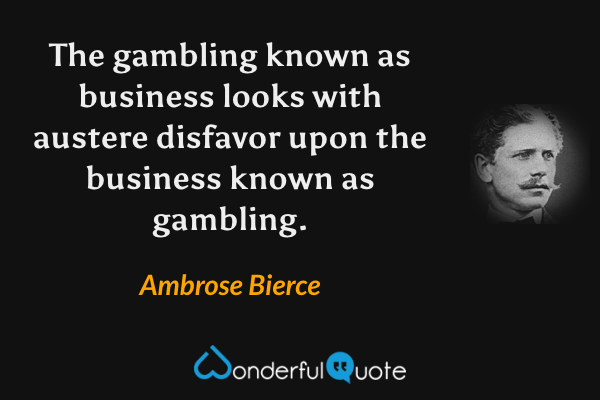
The gambling known as business looks with austere disfavor upon the business known as gambling.
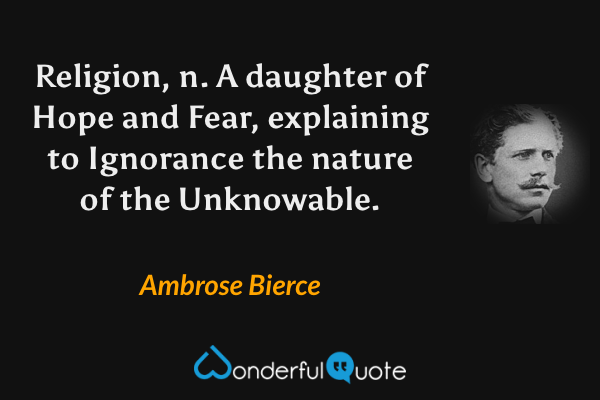
Religion, n. A daughter of Hope and Fear, explaining to Ignorance the nature of the Unknowable.
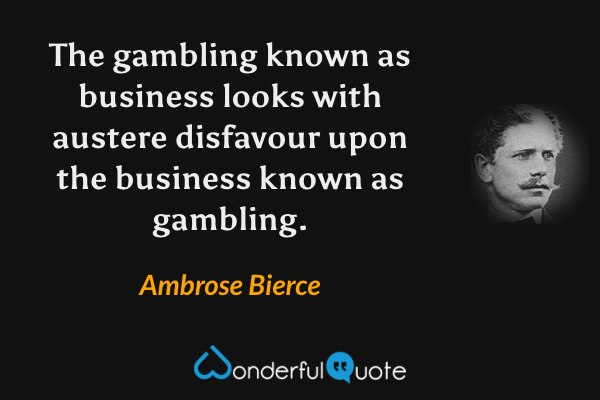
The gambling known as business looks with austere disfavour upon the business known as gambling.

Bigot, n. One who is obstinately and zealously attached to an opinion that you do not entertain.
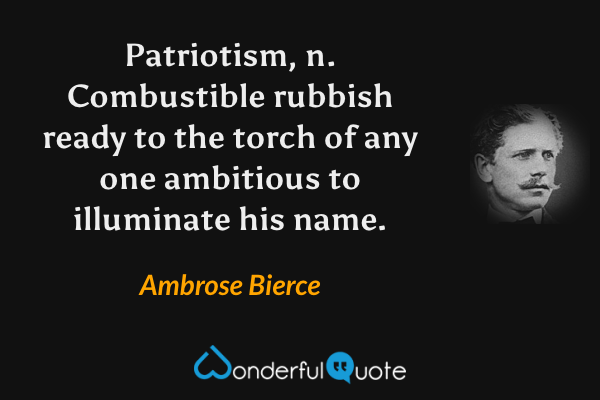
Patriotism, n. Combustible rubbish ready to the torch of any one ambitious to illuminate his name.
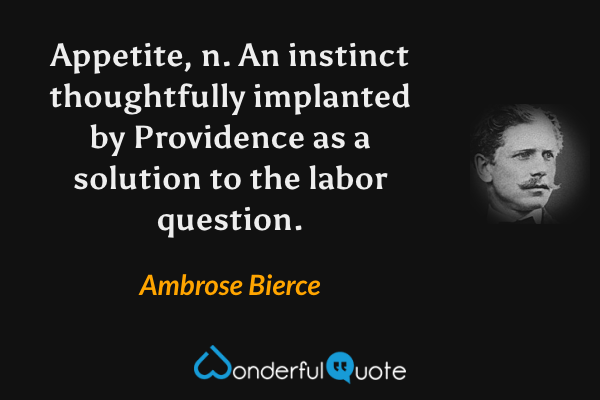
Appetite, n. An instinct thoughtfully implanted by Providence as a solution to the labor question.
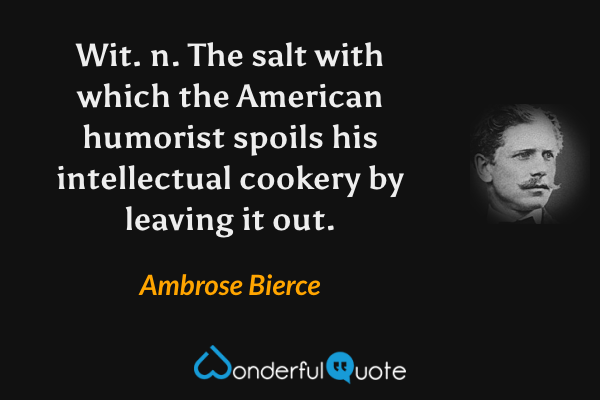
Wit. n. The salt with which the American humorist spoils his intellectual cookery by leaving it out.
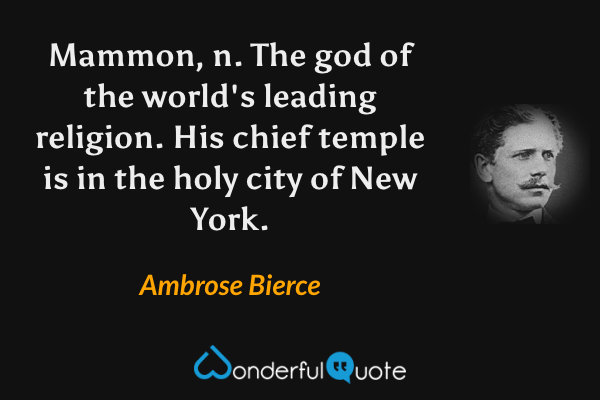
Mammon, n. The god of the world's leading religion. His chief temple is in the holy city of New York.
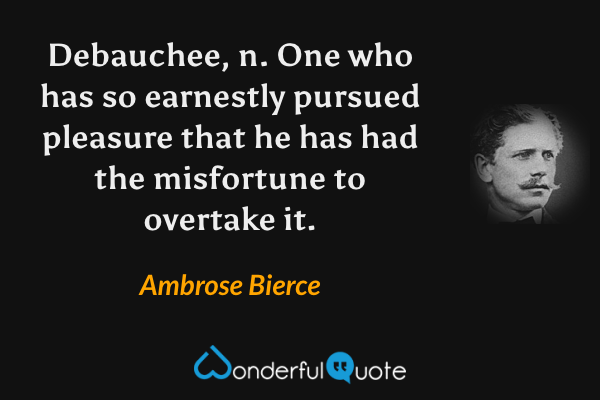
Debauchee, n. One who has so earnestly pursued pleasure that he has had the misfortune to overtake it.
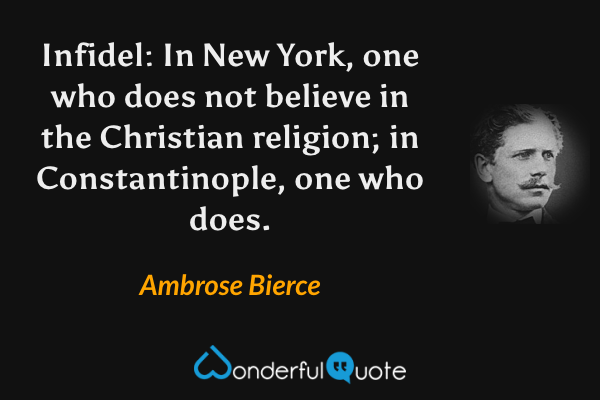
Infidel: In New York, one who does not believe in the Christian religion; in Constantinople, one who does.
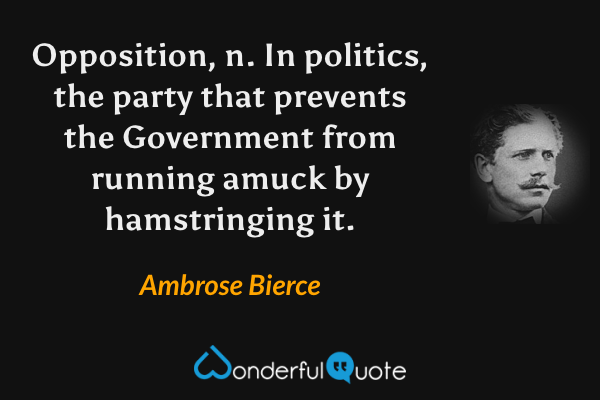
Opposition, n. In politics, the party that prevents the Government from running amuck by hamstringing it.
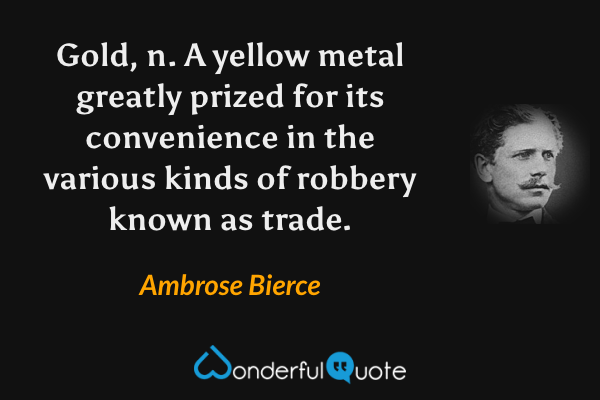
Gold, n. A yellow metal greatly prized for its convenience in the various kinds of robbery known as trade.
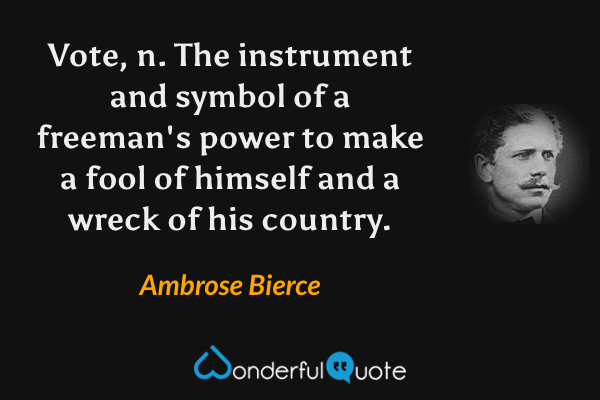
Vote, n. The instrument and symbol of a freeman's power to make a fool of himself and a wreck of his country.
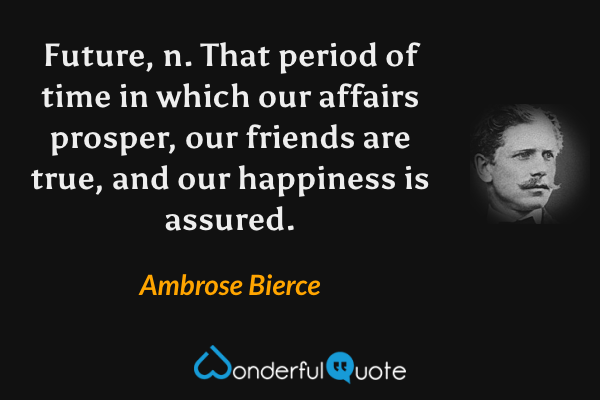
Future, n. That period of time in which our affairs prosper, our friends are true, and our happiness is assured.
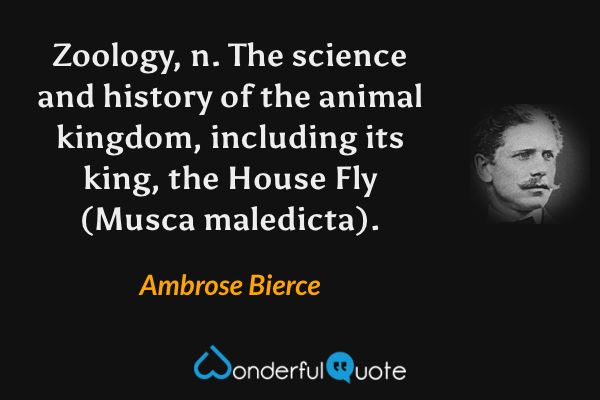
Zoology, n. The science and history of the animal kingdom, including its king, the House Fly (Musca maledicta).
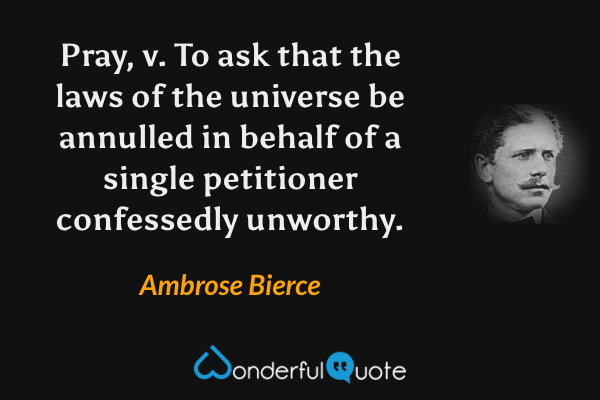
Pray, v. To ask that the laws of the universe be annulled in behalf of a single petitioner confessedly unworthy.

Zeal, n. A certain nervous disorder afflicting the young and inexperienced. A passion that goeth before a sprawl.

Faith, n. Belief without evidence in what is told by one who speaks without knowledge, of things without parallel.
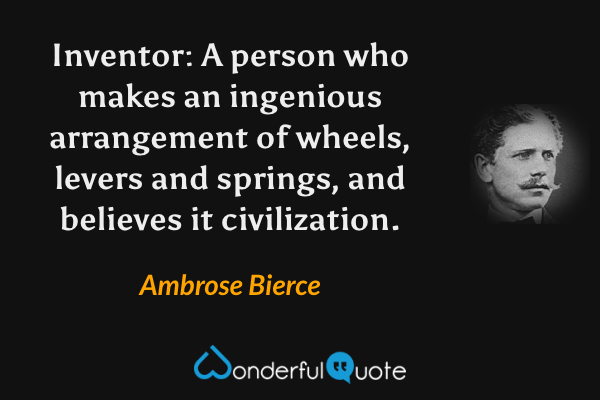
Inventor: A person who makes an ingenious arrangement of wheels, levers and springs, and believes it civilization.

English, n. A language so haughty and reserved that few writers succeed in getting on terms of familiarity with it.
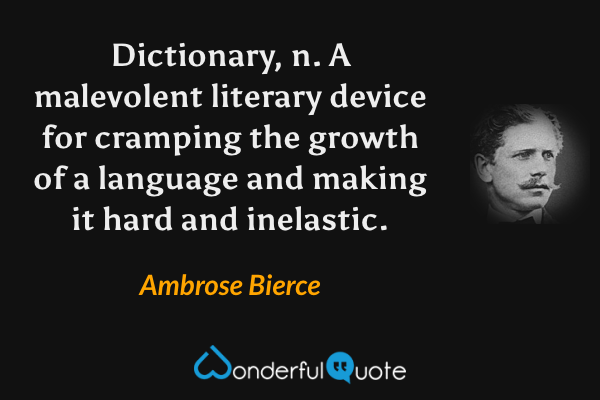
Dictionary, n. A malevolent literary device for cramping the growth of a language and making it hard and inelastic.
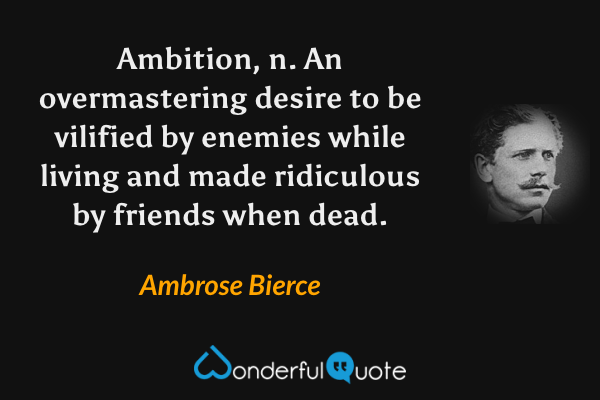
Ambition, n. An overmastering desire to be vilified by enemies while living and made ridiculous by friends when dead.
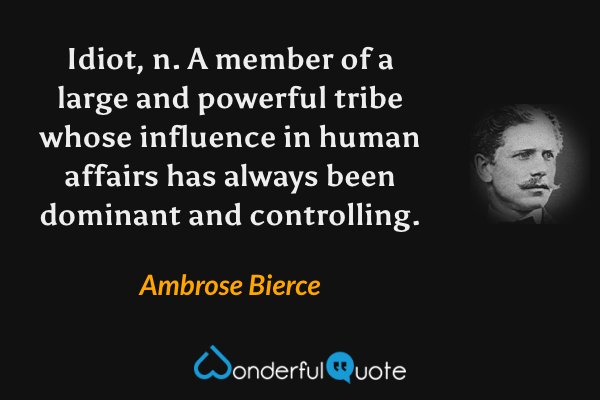
Idiot, n. A member of a large and powerful tribe whose influence in human affairs has always been dominant and controlling.
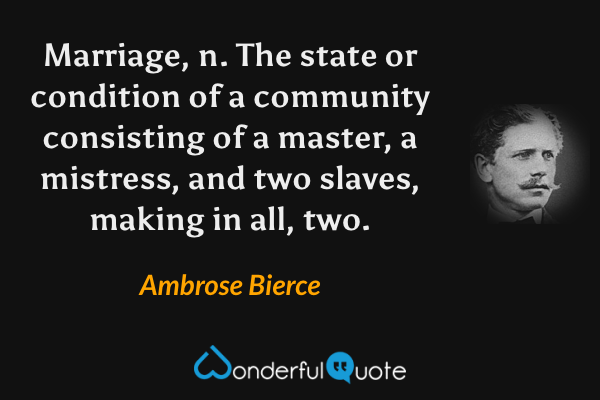
Marriage, n. The state or condition of a community consisting of a master, a mistress, and two slaves, making in all, two.
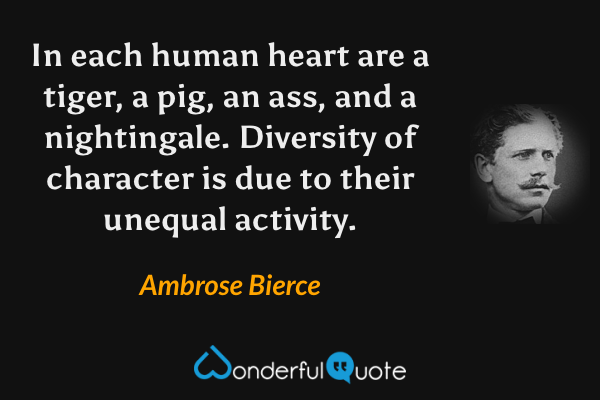
In each human heart are a tiger, a pig, an ass, and a nightingale. Diversity of character is due to their unequal activity.
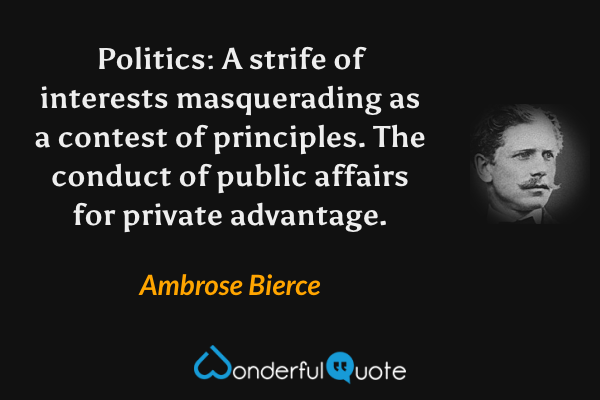
Politics: A strife of interests masquerading as a contest of principles. The conduct of public affairs for private advantage.
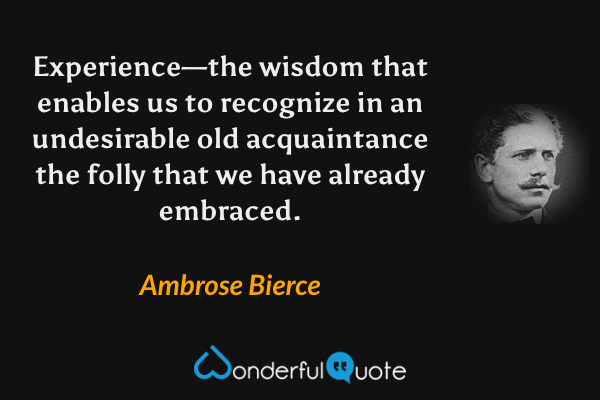
Experience—the wisdom that enables us to recognize in an undesirable old acquaintance the folly that we have already embraced.
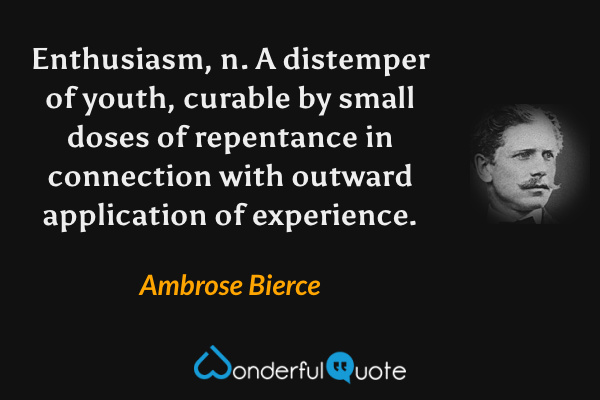
Enthusiasm, n. A distemper of youth, curable by small doses of repentance in connection with outward application of experience.

For every man there is something in the vocabulary that would stick to him like a second skin. His enemies have only to find it.
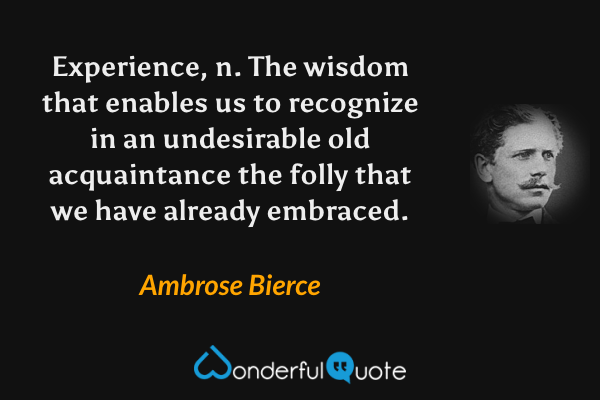
Experience, n. The wisdom that enables us to recognize in an undesirable old acquaintance the folly that we have already embraced.
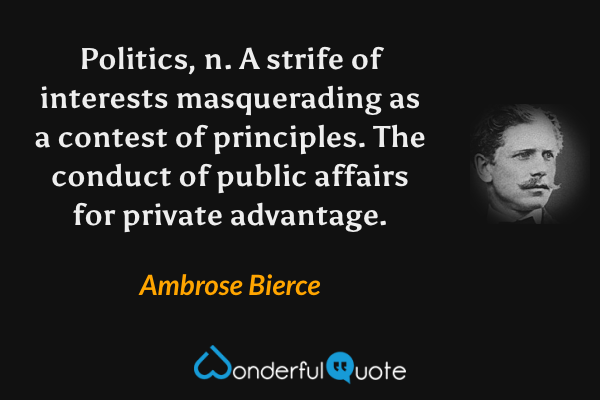
Politics, n. A strife of interests masquerading as a contest of principles. The conduct of public affairs for private advantage.

Patriot, n. One to whom the interests of a part seem superior to those of a whole. The dupe of statesman and the tool of conquerors.
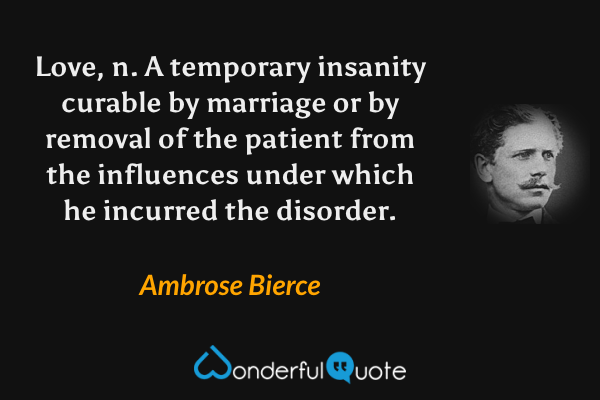
Love, n. A temporary insanity curable by marriage or by removal of the patient from the influences under which he incurred the disorder.
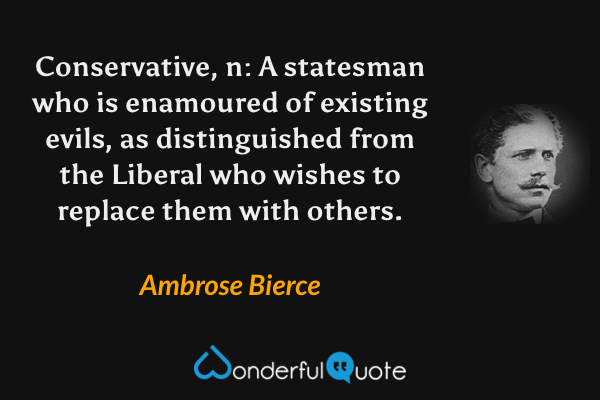
Conservative, n: A statesman who is enamoured of existing evils, as distinguished from the Liberal who wishes to replace them with others.
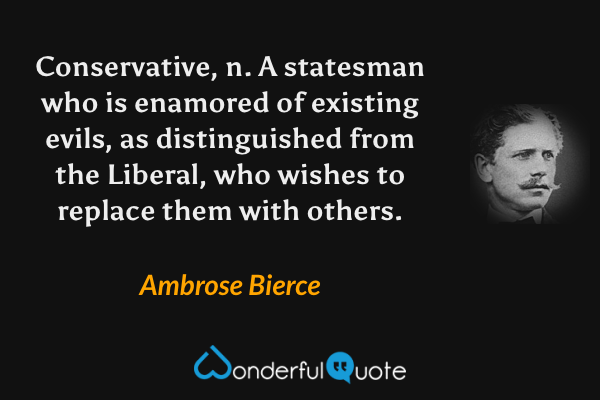
Conservative, n. A statesman who is enamored of existing evils, as distinguished from the Liberal, who wishes to replace them with others.

Christian, n.: one who believes that the New Testament is a divinely inspired book admirably suited to the spiritual needs of his neighbour.
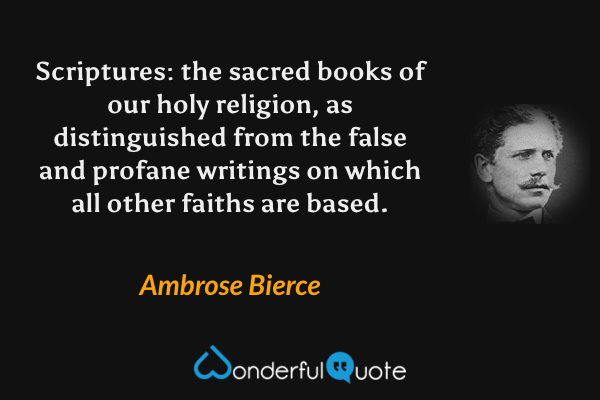
Scriptures: the sacred books of our holy religion, as distinguished from the false and profane writings on which all other faiths are based.
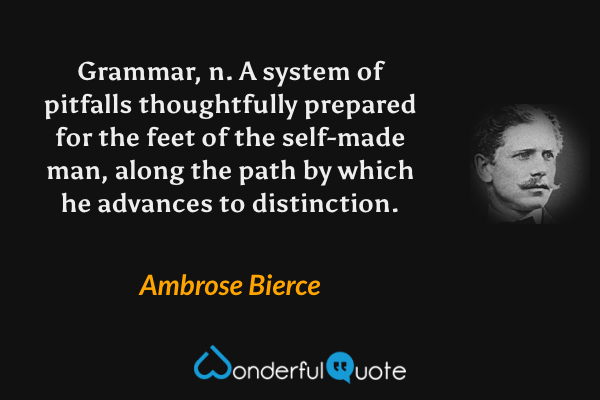
Grammar, n. A system of pitfalls thoughtfully prepared for the feet of the self-made man, along the path by which he advances to distinction.
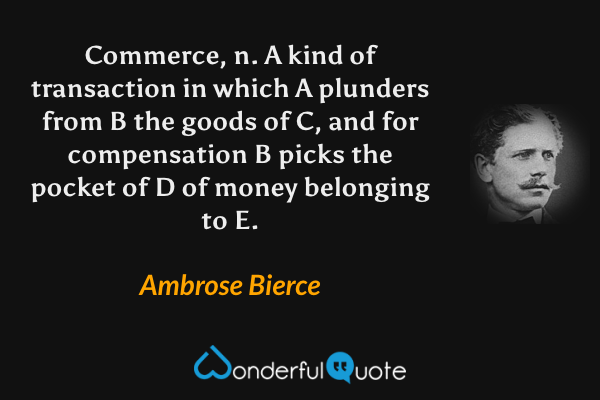
Commerce, n. A kind of transaction in which A plunders from B the goods of C, and for compensation B picks the pocket of D of money belonging to E.
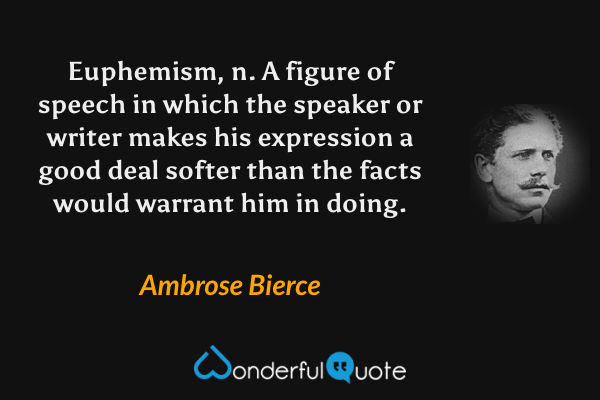
Euphemism, n. A figure of speech in which the speaker or writer makes his expression a good deal softer than the facts would warrant him in doing.
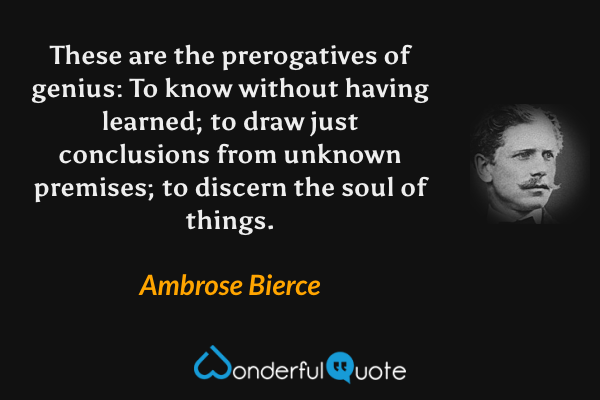
These are the prerogatives of genius: To know without having learned; to draw just conclusions from unknown premises; to discern the soul of things.

Abnormal, adj. Not conforming to standard. In matters of thought and conduct, to be independent is to be abnormal, to be abnormal is to be detested.
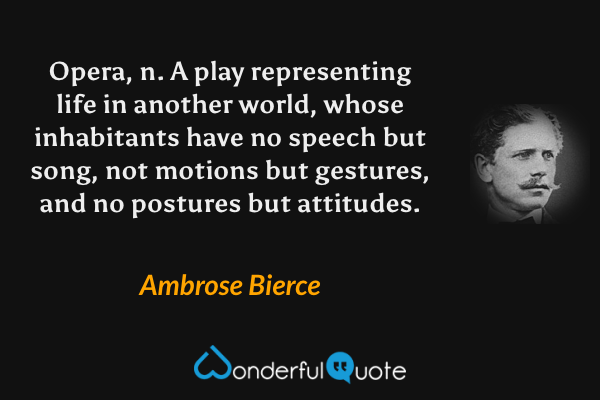
Opera, n. A play representing life in another world, whose inhabitants have no speech but song, not motions but gestures, and no postures but attitudes.
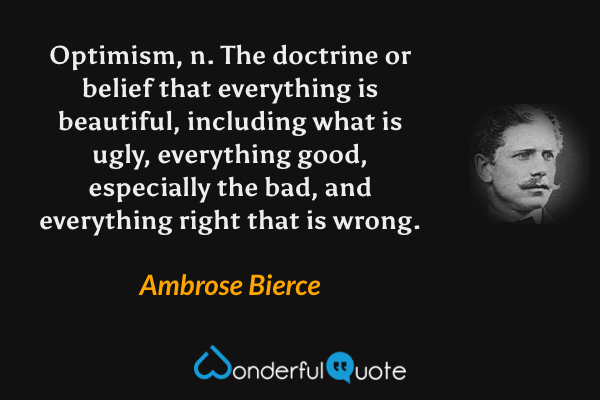
Optimism, n. The doctrine or belief that everything is beautiful, including what is ugly, everything good, especially the bad, and everything right that is wrong.

Insurance - an ingenious modern game of chance in which the player is permitted to enjoy the comfortable conviction that he is beating the man who keeps the table.
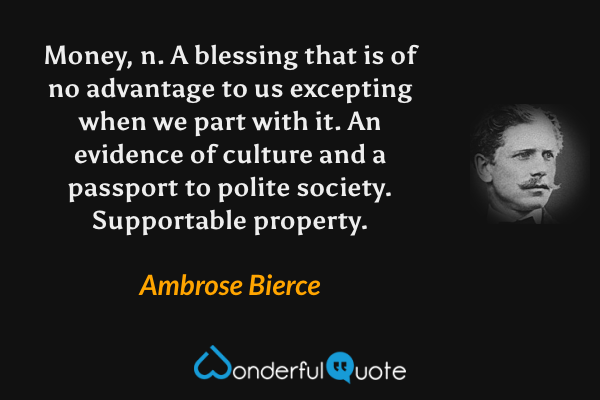
Money, n. A blessing that is of no advantage to us excepting when we part with it. An evidence of culture and a passport to polite society. Supportable property.
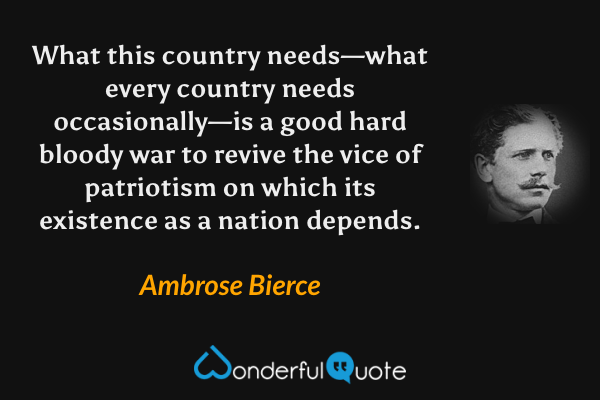
What this country needs—what every country needs occasionally—is a good hard bloody war to revive the vice of patriotism on which its existence as a nation depends.
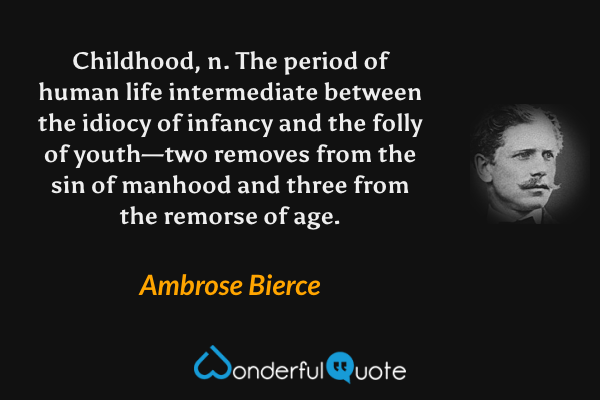
Childhood, n. The period of human life intermediate between the idiocy of infancy and the folly of youth—two removes from the sin of manhood and three from the remorse of age.
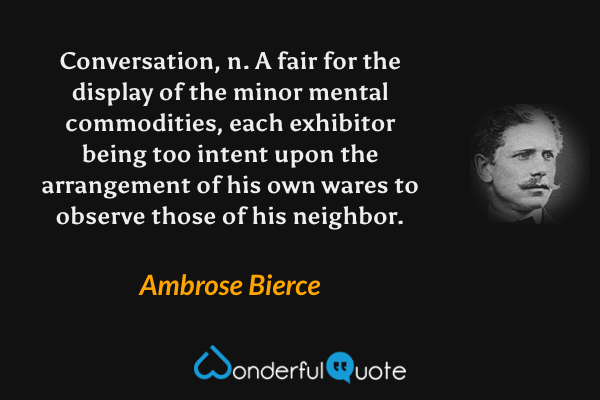
Conversation, n. A fair for the display of the minor mental commodities, each exhibitor being too intent upon the arrangement of his own wares to observe those of his neighbor.
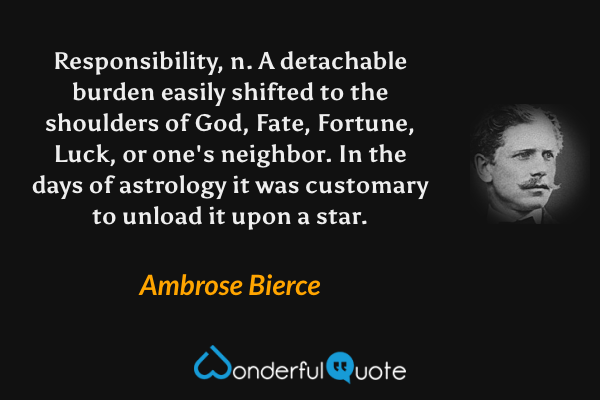
Responsibility, n. A detachable burden easily shifted to the shoulders of God, Fate, Fortune, Luck, or one's neighbor. In the days of astrology it was customary to unload it upon a star.
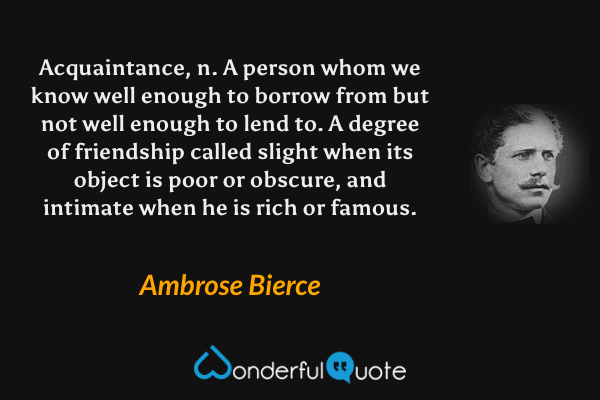
Acquaintance, n. A person whom we know well enough to borrow from but not well enough to lend to. A degree of friendship called slight when its object is poor or obscure, and intimate when he is rich or famous.
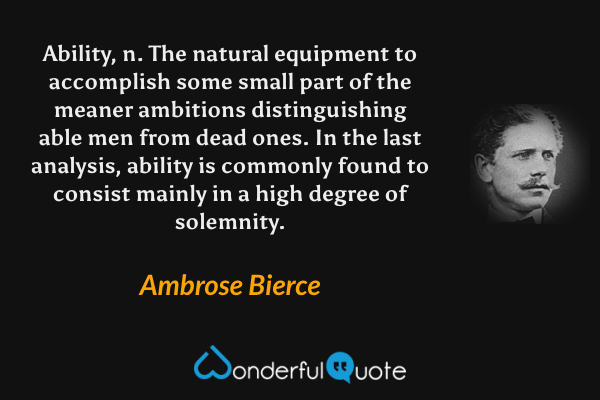
Ability, n. The natural equipment to accomplish some small part of the meaner ambitions distinguishing able men from dead ones. In the last analysis, ability is commonly found to consist mainly in a high degree of solemnity.
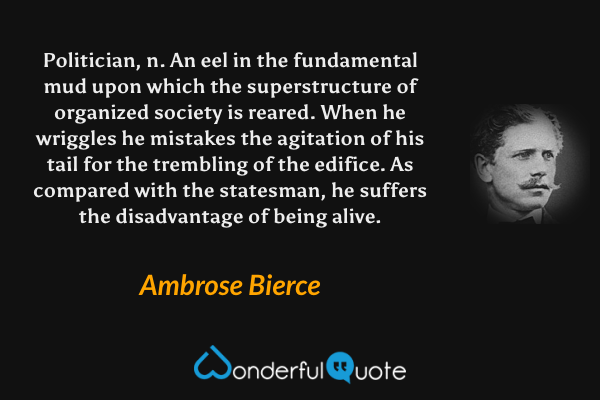
Politician, n. An eel in the fundamental mud upon which the superstructure of organized society is reared. When he wriggles he mistakes the agitation of his tail for the trembling of the edifice. As compared with the statesman, he suffers the disadvantage of being alive.
Future, n. That period of time in which our affairs prosper, our friends are true and our happiness is assured.
Pray, v.: To ask that the laws of the universe be annulled on behalf of a single petitioner confessedly unworthy.


